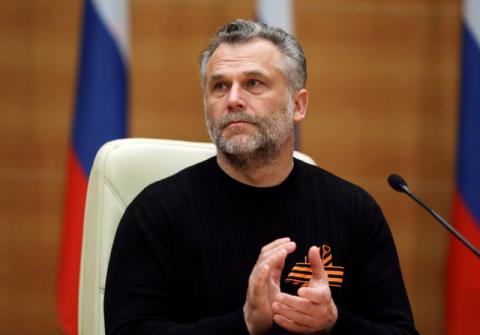Advertisement
Life under Russia not all it was cracked up to be - Crimean ex-leader
SEVASTOPOL, Crimea (Reuters) - The pro-Moscow Crimean politician who signed a document handing control over the Ukrainian peninsula to Russia in March 2014 said the three years since had been a time of disappointment for many people in the region.
Alexei Chaliy, who at the time of Russia's annexation was the self-proclaimed governor of Crimea's biggest city Sevastopol, said he has no regrets about the region becoming part of Russia - a status that Ukraine and most other countries do not recognize.
But he took issue with the way the region had been run since, saying local leaders who took over from him were ineffective, plans to develop the economy had gone nowhere, and prices for consumer goods had shot up.
"If we're talking about changes linked to quality of life in the region, then here - we have to acknowledge - in a significant way things don't correspond to what was expected," Chaliy said.
Russia's annexation of Crimea, in the days after an uprising installed pro-Western leaders in the Ukrainian capital, prompted Europe and the United States to impose sanctions on Russia and dragged east-West relations to their lowest level since the Cold War.
Chaliy, a 55-year-old businessman, played a major role in events on the ground leading up to the annexation.
While Russian soldiers appeared on the streets, and many officials loyal to Kiev fled, Chaliy took de facto control of the local administration in the city of Sevastopol. Crimea voted to join Russia in a referendum that is regarded as illegitimate by Ukraine and Western states.
Soon after the vote, Chaliy, dressed in his trademark tight black sweater, attended a March 18 Kremlin ceremony with Russian President Vladimir Putin to co-sign a document on Crimea's status within Russia.
Afterwards, he served briefly as the Moscow-backed governor of Sevastopol before stepping aside for new leaders. He is now a member of the Sevastopol legislative assembly.
In an interview in his office in the city - three years after the annexation - Chaliy said that Sergei Menyailo, who took over from him as Moscow-backed governor of Sevastopol, had failed to follow up on a strategy for economic development.
"Why didn't it work out? Because the executive arm which came in ... turned out to be incompetent and unwilling," Chaliy said. "Therefore if we're talking about expectations, then a lot of expectations were not fulfilled."
He also said that funds injected from Moscow were misspent by the local administration.
Menyailo was moved from the post last year and is now the presidential plenipotentiary for Siberia. He did not respond to a Reuters request for comment. Chaliy said he supported the new governor.
Most Crimean residents interviewed by Reuters reporters over several visits in the past few months said they had no wish to go back to rule from Kiev.
HARSH REALITY
Chaliy said many people in Crimea had hankered for the certainties of life in the Soviet Union, the last time the peninsula was ruled from Moscow.
"There are lots of people who are disappointed because ... it wasn't Russia they were joining but, for many of them, it was the Soviet Union. Back to 1988 or 1989, when factories were operating and there were loads of specialists and jobs."
"They don't understand that this won't happen, and cannot happen."
Soon after Russian's annexation, pensions and public sector wages rose dramatically because they were brought into line with Russian levels, higher than in Ukraine.
This though was offset by a rise in prices in stores, partly the result of difficulties of getting goods to the peninsula - which is not connected by land to Russia.
"For us, 2015 and 2016 were very difficult from the point of view of inflation. Now the process has stabilized. As a whole, prices are at a high level. In Sevastopol they're higher than anywhere else," said Chaliy.
"Of course, if you compare this with people's expectations, then in this sense a lot of people are disappointed."
The private sector, heavily dependent on tourism, has suffered. Ukrainian tourists stopped visiting, and major companies, including some Russian ones, suspended investments because of the risk of being hit by sanctions.
"Businessmen are accustomed to going skiing in Europe and nobody wants to leave themselves open" to being included on a list of people barred from entering the European Union, Chaliy said.
He saw no prospect of the sanctions being lifted any time soon, and offered advice to his fellow Crimeans: "Breathe slowly, relax, and live under a state of sanctions."
(Editing by Christian Lowe and Pravin Char)



















Add new comment